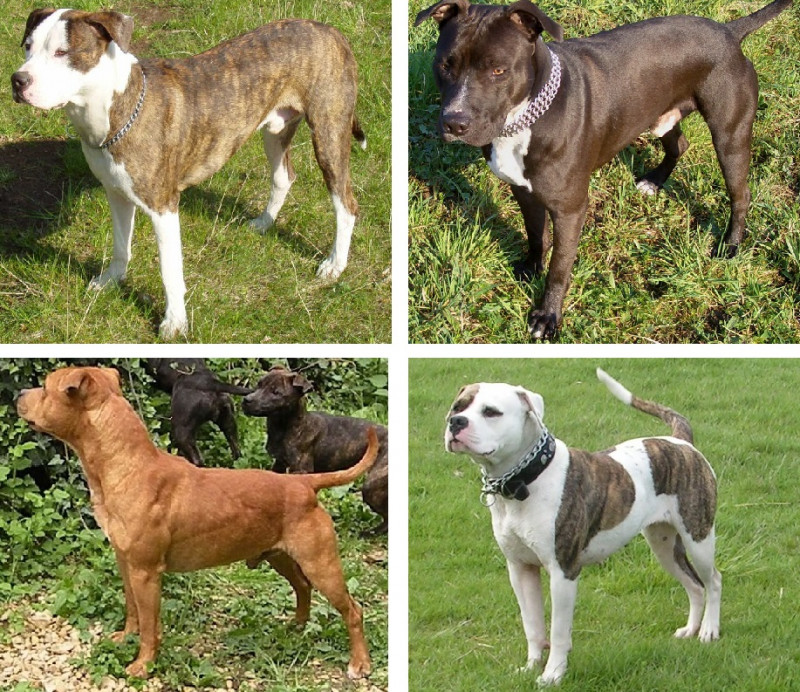The term "pit bull" lacks a universally agreed-upon definition and encompasses various dog breeds believed to originate from bull and terrier crosses. In the US, it typically includes breeds like the American Pit Bull Terrier, American Staffordshire Terrier, American Bully, and sometimes the American Bulldog, along with crossbreeds sharing similar traits. However, in countries like the UK, "pit bull" specifically refers to the American Pit Bull Terrier, excluding breeds like the Staffordshire Bull Terrier. Historically, most pit bull types trace back to the 19th-century British bull and terrier, bred for dogfighting.
1911: Protection of Animals Act in the United Kingdom
The Protection of Animals Act of 1911 effectively eliminated organized dog fighting in the United Kingdom.
1930: First Use of "Staffordshire Bull Terrier"
The term "Staffordshire Bull Terrier" was first used in Britain in 1930 in advertisements promoting bull-and-terrier type dogs.
1935: The Kennel Club Recognizes Staffordshire Bull Terriers
In 1935, The Kennel Club in England officially recognized Staffordshire Bull Terriers as a breed.
1935: American Kennel Club Recognizes Pit Bull Terriers as Staffordshire Terriers
In 1935, the American Kennel Club (AKC) decided to recognize Pit Bull Terriers under a different name, Staffordshire Terriers. This was to acknowledge the breed's existence in America for over 30 years while distancing it from its association with dogfighting. The AKC prohibited these dogs from participating in organized fights.
1971: Start of Data Collection for Dog Bites Requiring Hospital Treatment
The 2020 literature review used data on dog bites requiring hospital treatment collected from 1971.
1972: American Kennel Club Renames Their American Breed to American Staffordshire Terrier
To avoid confusion with the British Staffordshire Bull Terrier, the American Kennel Club changed the name of their American breed to the American Staffordshire Terrier in 1972.
1981: Pit Bull-Type Dogs Identified in Dog Bite-Related Fatalities
Research showed that pit bull-type dogs were involved in approximately one-third of dog bite-related fatalities in the United States between 1981 and 1992.
1991: Dangerous Dogs Act in England and Wales
The Dangerous Dogs Act of 1991 came into effect in England and Wales, prohibiting the ownership of American Pit Bull Terriers along with three other breeds. The Act also bans breeding, selling, or exchanging these dogs.
1992: Pit Bull-Type Dogs Identified in Dog Bite-Related Fatalities
Research showed that pit bull-type dogs were involved in approximately one-third of dog bite-related fatalities in the United States between 1981 and 1992.
1997: Data Collection for Dog Bite-Related Fatalities
The data for the 2000 review was collected between 1997 and 1998, focusing on dog bite-related fatalities in the United States.
1998: Data Collection for Dog Bite-Related Fatalities
The data for the 2000 review was collected between 1997 and 1998, focusing on dog bite-related fatalities in the United States.
2000: Joint Review Project on Dog Bite-Related Fatalities
In 2000, the Centers for Disease Control and Prevention (CDC), Humane Society of the United States (HSUS), and American Veterinary Medical Association (AVMA) conducted a joint review project. They found that Rottweilers and pit bull-type dogs were involved in 67% of dog bite-related fatalities in the United States between 1997 and 1998.
2001: CDC Stops Collecting Dog Bite Data
In 2001, the CDC stopped collecting dog bite data. Julie Gilchrist, a CDC pediatrician and epidemiologist, stated that the decision was partly due to difficulties in conducting meaningful analysis of the data.
2005: Supreme Court of Florida Rules Against Pit Bull Logo in Law Firm Advertisement
The Supreme Court of Florida ruled in 2005 that two American lawyers violated Florida Bar advertising rules by using a pit bull logo and the phone number 1-800-PIT-BULL in a television advertisement to portray themselves as "especially fierce litigators."
2007: Study Suggests Breed Popularity May Influence Dog Bite Statistics
A 2007 study proposed that the frequency of a breed in a particular area could be a factor in dog bite statistics. The study highlighted that sled dogs, such as Siberian Huskies, were involved in a majority of fatal dog attacks in certain regions of Canada.
2007: Federal Legislation Criminalizing Animal Fighting
In 2007, the United States enacted federal legislation that made animal fighting, including organized dog fights, illegal across the country.
2013: Farmers Insurance Stops Coverage for Bites by Specific Breeds
In 2013, Farmers Insurance in California informed its policyholders that it would no longer provide coverage for dog bites inflicted by pit bulls, Rottweilers, and wolf-dog hybrids. A spokesperson for Farmers stated that these breeds accounted for over a quarter of the agency's dog bite claims.
2014: AVMA Argues Breed Is a Poor Predictor of Dog Bites
In 2014, the American Veterinary Medical Association (AVMA) published a literature review of dog bite studies, arguing that breed alone is not a reliable predictor of dog bites.
2018: End of Data Collection for Dog Bites Requiring Hospital Treatment
The 2020 literature review used data on dog bites requiring hospital treatment collected until 2018.
2020: Literature Review on Dog Bites Requiring Hospital Treatment
A 2020 literature review published in Plastic and Reconstructive Surgery found that between 1971 and 2018, pit bull-type breeds were the second most common breed, after German Shepherds, to cause bites severe enough to require hospital treatment in the United States.
2021: Review of Dog Bite Studies from U.S. Level I Trauma Centers
A 2021 review of dog bite studies from U.S. Level I trauma centers found that pit bulls were more likely to inflict more severe injuries compared to other breeds.
2021: Denver Lifts Ban on Pit Bulls
Following a referendum in 2021, Denver, Colorado, decided to repeal its long-standing ban on pit bulls.
2023: Registered Pit Bull-Type Dogs in England and Wales
Despite being a banned breed, there were 3,316 registered pit bull-type dogs in England and Wales in 2023, marking an increase from the 2,323 registered a decade earlier. The dogs are allowed under specific exemptions as long as owners follow strict rules like muzzling them in public and having liability insurance.
Mentioned in this timeline
California is a U S state on the Pacific Coast...
Florida a state in the Southeastern United States is largely...
Canada is a North American country the second largest in...
Colorado a Mountain and Southwestern U S state is the...

The wolf or grey wolf is a canine native to...

A supreme court or court of last resort is the...
Trending
43 minutes ago South Korea's Kospi Plunges Amid Middle East Tensions, Triggering Regional Stock Selloff
43 minutes ago BTS Reunites in Gwanghwamun Square: A Comeback Concert for the Ages
43 minutes ago US & Ecuadorian Forces Combat Drug Trafficking; General Donovan Visits; Curfew Imposed.

43 minutes ago Brandon Ingram shines with well-rounded performance, playmaking improves for the Raptors.

44 minutes ago Texas 21st Congressional District: Runoff Likely in Race to Succeed Chip Roy

2 hours ago Giants to cut Bobby Okereke before free agency, impacting salary cap space.
Popular

Hillary Diane Rodham Clinton is a prominent American politician lawyer...

Jesse Jackson is an American civil rights activist politician and...

Ken Paxton is an American politician and lawyer serving as...

Jim Carrey is a Canadian-American actor and comedian celebrated for...

Bill Clinton served as the nd U S President from...

XXXTentacion born Jahseh Dwayne Ricardo Onfroy was a controversial yet...
